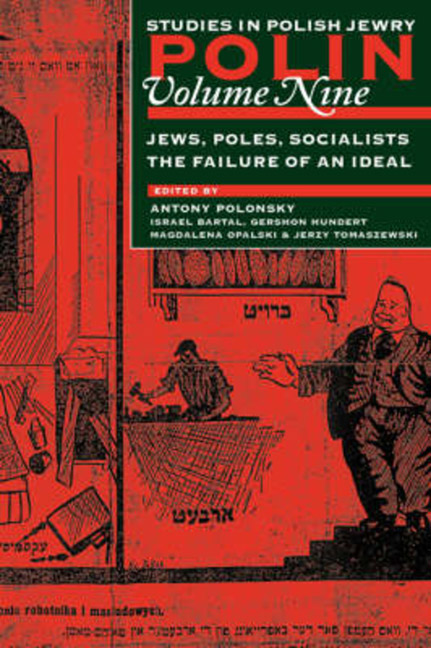Book contents
- Frontmatter
- Dedication
- Editors and Advisers
- Preface
- Acknowledgement
- Polin
- Polin: Studies in Polish Jewry
- Contents
- Note on Transliteration, Names, and Place Names
- Abbreviations
- Introduction
- PART I POLES, JEWS, SOCIALISTS: THE FAILURE OF AN IDEAL
- PART II NEW VIEWS
- PART III REVIEWS
- REVIEW ESSAYS
- BOOK REVIEWS
- Alfred Ebenbauer and Klaus Zatloukal (eds.), Die Juden in ihrer mittelalterlichen Umwelt
- Rivka Schatz-Uffenheimer, Hasidism as Mysticism
- Jadwiga Maurer, ‘Z matki obcej … ’
- Władyslaw T. Bartoszewski and Antony Polonsky (eds.), The Jews in Warsaw
- Maria Klańska, Problemfeld Galizien in deutschsprachiger Prosa 1846-191
- Israel Oppenheim, Tenuat Heḥaluts bePolin, 1929-1939
- The Letters of Martin Duber, ed. Nahum N. Glatzer and Paul Mendes-Flohr
- Alexander Heider, A Dictionary of Jewish Surnames from the Russian Empire
- Alice L. Eckardt (ed.), Burning Memory
- Ruta Sakowska, Ludzie z dzielnicy zamkniętej
- lwona Irwin-Zarecka, Neutralizing Memory
- Stanislaw Meducki and Zenon Wrona (eds.), Antyzydowskie wydarzenia kieleckie, 4 lipca 1946
- Bibliography Of Polish-Jewish Studies, 1993
- Notes on Contributors
- Notes on Translators
- Glossary
- Index
Jadwiga Maurer, ‘Z matki obcej … ’
from BOOK REVIEWS
- Frontmatter
- Dedication
- Editors and Advisers
- Preface
- Acknowledgement
- Polin
- Polin: Studies in Polish Jewry
- Contents
- Note on Transliteration, Names, and Place Names
- Abbreviations
- Introduction
- PART I POLES, JEWS, SOCIALISTS: THE FAILURE OF AN IDEAL
- PART II NEW VIEWS
- PART III REVIEWS
- REVIEW ESSAYS
- BOOK REVIEWS
- Alfred Ebenbauer and Klaus Zatloukal (eds.), Die Juden in ihrer mittelalterlichen Umwelt
- Rivka Schatz-Uffenheimer, Hasidism as Mysticism
- Jadwiga Maurer, ‘Z matki obcej … ’
- Władyslaw T. Bartoszewski and Antony Polonsky (eds.), The Jews in Warsaw
- Maria Klańska, Problemfeld Galizien in deutschsprachiger Prosa 1846-191
- Israel Oppenheim, Tenuat Heḥaluts bePolin, 1929-1939
- The Letters of Martin Duber, ed. Nahum N. Glatzer and Paul Mendes-Flohr
- Alexander Heider, A Dictionary of Jewish Surnames from the Russian Empire
- Alice L. Eckardt (ed.), Burning Memory
- Ruta Sakowska, Ludzie z dzielnicy zamkniętej
- lwona Irwin-Zarecka, Neutralizing Memory
- Stanislaw Meducki and Zenon Wrona (eds.), Antyzydowskie wydarzenia kieleckie, 4 lipca 1946
- Bibliography Of Polish-Jewish Studies, 1993
- Notes on Contributors
- Notes on Translators
- Glossary
- Index
Summary
For many historical, and therefore socio-psychological, reasons, Poland has hundreds of statues of her beloved writers but a modern biography of none. We needed our great poets to serve us as teachers and prophets, to be our national heroes and role models, to represent rather than to reveal. Thus, one of the functions of Polish literary scholars was to create and preserve legends of the geniuses’ lives, cleansed of any aspects considered controversial or inappropriate. Needless to say, the task kept them very busy, since ‘shrinology’ is a tough field anywhere-witness the struggles of the defenders of the ‘Freud Archives-and the inhabitants of the Polish Hall of Fame, for all their great virtues, are a pretty unruly crowd. And as greatness almost by definition implies controversy, the best and most important require particular vigilance against the approaches of the truth-seekers, the blasphemers. Not surprisingly, then, the biggest of all Polish literary monuments, Adam Mickiewicz, has been guarded by generations of the mightiest scholariy troops, steering the readers away from his darker, disturbing features. In his preface to Mickiewicz's Collected Works, published in 1929, Tadeusz Żeleński (Boy) wrote: ‘He was for a whole century our national banner. All parties were therefore trying to fly it from their flagpoles. He has been twisted, trimmed, read with the intention of finding only what was sought. Mickiewicz, we can say, never belonged-could not belong-to the “normal” history of literature.'
Seventy years, and several new or restored flagpoles later, Professor Jadwiga Maurer of Kansas University proves with her excellently researched study of what she calls Mickiewicz's affiliations with the Jewish world that little has changed since Boy's outcry. In the introductory chapter of her short but dense book she points to the three areas which have traditionally daunted Mickiewicz scholars: adulterous relations, the leading role in Andrzej Towiański's sect Koło Boże (God's Circle), and, above all, the interest in Jews and Judaism. The ban on Mickiewicz's love affairs, first lifted by Boy, has been entirely removed in the last decades, as no one seemed offended any more. The same applies, up to a point, to Mickiewicz's involvement with Towiański, quite thoroughly examined in several recent publications, which conclude that in joining Koło Boże Mickiewicz was the victim of delusions, depression, and manipulations.
- Type
- Chapter
- Information
- Jews, Poles, Socialists: The Failure of an Ideal , pp. 276 - 279Publisher: Liverpool University PressPrint publication year: 2008

